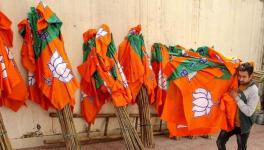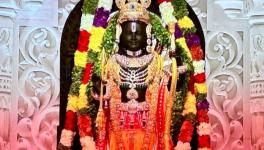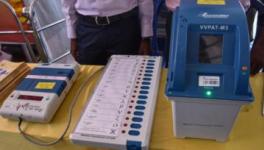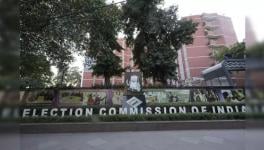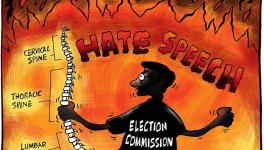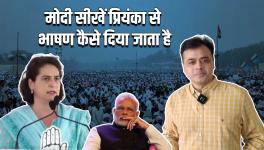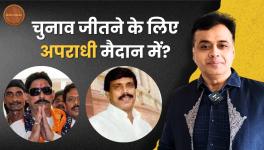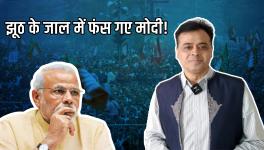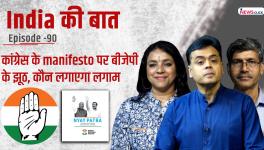The Unending Discomfort of RSS With the Constitution
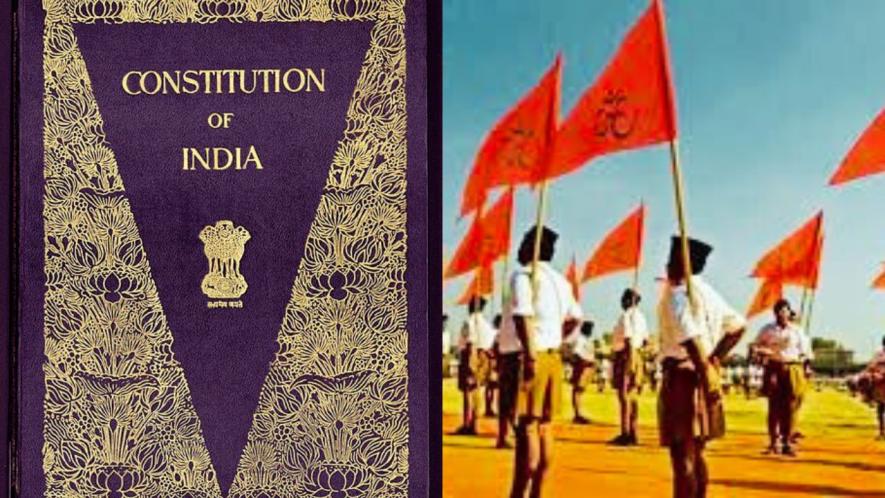
..make India an independent sovereign republic and guarantee and secure for all the people of India social, economic and political justice; equality of status and opportunities and equality before law; and fundamental freedoms—of speech, expression, belief, faith, worship, vocation, association and action—subject to law and public morality;
and also ensure that
adequate safeguards shall be provided for minorities, backward and tribal areas, and depressed and other backward classes.
(Excerpts of Objectives Resolution in the Constituent Assembly, moved by Pandit Nehru on December 13, 1946 and adopted unanimously by the Constituent Assembly on January 22, 1947)
It was just another press conference in the national capital.
The only difference was that it was held at the house of a member of Parliament belonging to Bharatiya Janata Party (BJP), the main opposition party then. The guests/speakers who were to address the media on that winter evening were also not much familiar to the media fraternity.
This was on December 25, 1992. Less than three weeks before India had witnessed one of its deeply troubling, disturbing moment in its history where a mosque, which stood for more than 500 years, had been demolished by a horde of people who had gathered there from different parts of the Country, mobilised by the forces of Hindutva supremacism.
The demolition had given rise to a spate of 'communal riots' -- as they are called in the official lexicon -- all over the country, witnessing deaths and destruction on an unprecedented scale. Broad masses of the people were still coming to terms with this moment of rupture in their memory when 'Republic Was Besmirched'.
Swami Muktanand and Vamdeo Maharaj, who were closely associated with the Ram Mandir movement (India Today, January 31, 1993) addressed the press meet.
'This Constitution is anti Hindu' and needs to be rejected.''We have no faith in country's laws' and 'Sadhus are above the law of the land'.'
The duo, which like many of their ilk who had gained visibility during ‘Ram Mandir Wahin Banayenge' openly criticised India's citizenship law that declared everyone born here as a citizen, but were also peeved about everybody being equal before law. (A G Noorani, RSS, Leftword - Page 40-41)
To hide their disdain for the Constitution, they waxed eloquent about earlier traditions, customs, the hierarchies and said how makers of India's Constitution should have learned from them or rather followed them.
The press meet ended rather abruptly.
Journalists, who had gathered there to hear something about the movement, felt cheated that what unfolded there was an anti-climax.
Little did they have a premonition that the press meet was just an opening shot and more was coming.
Less than a week later a White Paper, prepared by Swami Muktanand himself, was released (January 1, 1993) by Hindutva organisations. The content of the White Paper resonated with the concerns expressed in the meeting.
Swami Heeranand had written an introduction to this White Paper which talked of the Constitution being 'contrary to India's culture, character and circumstances' and being 'foreign oriented' and fit to be ''nullified' immediately." It had no qualms in telling the readers that the damage done to India's psyche by 200 years of British slavery is 'negligible as compared to India's Constitution'
The front page of the White Paper posed two questions before the readers:
- Who is the destroyer of India's Integrity, brotherhood and Communal Amity?
- Who has spread starvation, unemployment, corruption and irreligion?'
The author himself has provided answers to these queries.
'Vartman Indian Samvidhan': For any sane person who could look at the country, which remained colonised for around two centuries and how it had emerged in the last more than four decades, more objectively, all the claims of the White Paper, were unfounded but also reeked of their prejudice towards particular people/ communities
It was for everyone to see how a colonised, humiliated, subjugated people had emerged after an intense independence struggle, and had drafted for themselves - on the basis of the aspirations and dreams of the people - a new path for themselves in the name of the Constitution and had turned a new leaf after witnessing killings of lakhs of people in partition riots or assassination of its foremost leader at the hands of a Hindutva fanatic.
On the contrary, for Râjju Bhaiya alias Rajendra Singh, the deemed Supremo of RSS, the White Paper was a 'Eureka' moment.
Despite the fact that it blamed every ill of the society over the Constitution, peddled a view that the damage caused by it was worse than two hundred years of British slavery and called for nullifying the Indian Constitution he was the first one to find merit in the argument presented in the White Paper
He used the pages of the Indian Express to share his views (January 14, 1993):
The present conflict can be partially attributed to the inadequacies of our system in responding to the needs of the essential India, its tradition, values and ethos, Certain specialities of this country should be reflected in the Constitution. In place of 'India that is Bharat’, we should have said Bharat that is Hindustanân.. Official documents refer to the composite culture, but ours is certainly not a composite culture. Culture is not wearing of clothes or speaking languages. In a very fundamental sense, this country has a unique cultural oneness. No country, if it has to survive, can have compartments. All this shows that changes are needed in the Constitution. A Constitution more suited to the ethos and genius of this country should be adopted in the future.
No doubt the gloss in the article could not hide the fact it was still a sanitised version of thinking within the RSS (Rashtriya Swayamsevak Sangh) which had never felt comfortable that independent India is having its own Constitution - which always tried to denigrate and stigmatise these efforts.
The Worst Thing about the New Constitution?
A journey down memory lane reveals that the very first formal reaction from predecessors of Rajju Bhaiya then -- a period when Madhav Sadashiv Golwalkar (1906-1973) was the Supremo of the 'cultural organisation' -- was indicative of the way they (RSS) viewed the Constitution.
The Constituent Assembly adopted the draft of the Constitution in November 1949 and within three days of its adoption an editorial in the Organiser (RSS mouthpiece) criticised it in no uncertain terms and praised Manusmriti:
“The worst [thing] about the new Constitution of Bharat, is that there is nothing Bharatiya about it… [T]here is no trace of ancient Bharatiya constitutional laws, institutions, nomenclature and phraseology in it”...“no mention of the unique constitutional developments in ancient Bharat. Manu’s laws were written long before Lycurgus of Sparta or Solon of Persia. To this day his laws as enunciated in the Manusmriti excite the admiration of the world and elicit spontaneous obedience and conformity [among Hindus in India]. But to our constitutional pundits that means nothing”. (Excerpts from an Editorial on Constitution, Organiser, November 30, 1949).
What is worth noting is that Organiser' was not alone in praising Manusmriti and counterposing it with the newly adopted Constitution. Another stalwart of the Hindutva movement, Vinayak Damodar Savarkar, lambasted the draft of the Constitution in no uncertain terms and emphasised that Manusmriti should have been made the basis of Indian Laws.
“Manusmriti is that scripture which is most worship-able after Vedas for our Hindu Nation and which from ancient times has become the basis of our culture-customs, thought and practice. This book for centuries has codified the spiritual and divine march of our nation. Even today the rules which are followed by crores of Hindus in their lives and practice are based on Manusmriti. Today Manusmriti is Hindu Law. That is fundamental. (VD Savarkar, ‘Women in Manusmriti’)
Their evaluation of the Hindu Code Bill, which happened to be the first attempt in independent India to reform Hindu personal laws to give greater rights to Hindu women, was equally damning.
Remember, it was a bold attempt to put a stamp on monogamy and also ensure separation rights to women and also grant them rights in property.
The Hindutva Right and the conservative sections within the Congress, coupled with saffron-robed Swamis and Sadhus, joined hands to oppose the enactment of the Hindu Code Bill. What is noticeable is that this motley combination of reactionary, status quoist forces did not limit themselves to issuing statements. The Bill faced opposition on the streets and led to large-scale mobilisation at a pan-India level.
There were occasions when they even tried to storm Dr B R Ambedkar's residence in Delhi.
The main argument peddled against Ambedkar was that the Bill was an attack on 'Hindu Religion and Culture'. (Economic Weekly, December 24, 1949 and Savarkar Samagar (collection of Savarkar’s writings in Hindi), Prabhat, Delhi, vol, 4, p. 415.)
An excerpt from Ramchandra Guha's book gives an idea about the resistance to the Bill.
“The anti-Hindu code bill committee held hundreds of meetings throughout India, where sundry swamis denounced the proposed legislation. The participants in this movement presented themselves as religious warriors (dharmaveer) fighting a religious war (dharmayudh). The Rashtriya Swayamsewak Sangh threw its weight behind the agitation. On the 11th of December, 1949, the RSS organised a public meeting at the Ramlila grounds in Delhi, where speaker after speaker condemned the bill. One called it ‘an atom bomb on Hindu society’… The next day a group of RSS workers marched on the assembly buildings, shouting ‘Down with Hindu code bill’… The protesters burnt effigies of the prime minister and Dr Ambedkar, and then vandalised the car of Sheikh Abdullah.”
Syama Prasad Mookerjee, founder of BJP’s predecessor, the Bharatiya Jan Sangh, had said the Bill would “shatter the magnificent structure of Hindu culture.'
False Notions of Nationhood!
The RSS and other Hindutva organisations were not only opposed to rights being granted to Hindu women, their opposition also extended to the affirmative action policies pushed ahead with the mandate of the Constitution for socially oppressed communities, castes like Dalits and adivasis (Scheduled Castes and Scheduled Tribes)
Golwalkar was of the opinion that with such policies, the ruling class is attacking the roots of Hindu Social Unity and the feeling of amity and harmony which existed earlier, is being attacked. He firmly denied that Hindu society is responsible for the plight of the lower castes and held constitutional provisions responsible for increasing mutual distrust and enmity between them.
For example, in his book, Bunch of Thoughts, Golwalkar had criticised such policies it in no uncertain terms
“We must cry a complete halt to forming groups based on caste, creed, etc., and demanding exclusive rights and privileges in services, financial aids, admission in educational institutions and all such other fields. To talk and think in terms of "minorities" and "communities" should be totally put an end to.”
Or, at another place in this book, he commented:
.. Dr Ambedkar had envisaged the special privileges for 'Scheduled Castes' for only 10 years from the day we became a republic in 1960. But it is going on, being extended. Continued vested interests in them in remaining as a separate entity. That would harm their integration with the rest of the society.
Another significant part of their disagreement veered around, who is an Indian.
The Indian Constitution had underlined that this nation does not belong to a particular religion and it belongs to whosoever is born here and who has been living here. This was in tune with the key concern of the anti-colonial movement, which had denied religion as a basis of nationhood. In fact, it is to the credit of the great leaders like Gandhi, Nehru, Patel and Maulana Azad that they accepted Partition of the country when the Muslim League insisted that religion be made a basis of a nation. Hindutva formations like the RSS and Hindu Mahasabha had never tried to hide their objection to this conception.
For example, RSS had unequivocally stated:
Let us no longer allow ourselves to be influenced by false notions of nationhood. Much of the mental confusion and the present and future troubles can be removed by the ready recognition of the simple fact that in Hindustan only the Hindus form the nation ... The nation must be built up of Hindus, on Hindu traditions, culture, ideas and aspirations. (RSS- Marketing Fascism as Hindu Nationalism, Shamsul Islam, Page 146, Media House, Delhi 2018)
The federal structure of the State envisaged by the Constitution, which was a basic feature of the Indian polity, was also questioned by RSS. It wanted a Unitary State.
His communication to the first Convention of the National Integration Council (1961) was equally revealing:
Today's federal form of government not only gives birth but also nourishes the feelings of separation, in a way refuses to recognize the fact of one nation and destroys it. It must be completely uprooted, constitution purified and unitary form of government be established. (SGSD, Vol I, P 11, quoted in ' RSS- Marketing Fascism as Indian Nationalism, Page 146; Or Shri Guruji Samagra, Page 128, Volume 3)
If Hindu Raj Becomes a Reality!
We can go on narrating innumerable references to show how RSS and its leaders crafted their response to the new Constitution, or how their discomfort over its bold claim enshrined in the Constitution, gets expressed even decades after its adoption.
Till date, they still seem to remain stuck with their sectarian worldview.
One can recall that in the mid-1960s, Golwalkar had given an interview to a Marathi daily, Navakal, wherein he had once again heaped praise on Manusmriti and found fault with the Constitution. His thoughts led to wide uproar in the Marathi society and a massive movement followed condemning these obsolete remarks.
Or similarly when the Jhajjar (Haryana) killings happened (October 2002), when Dalits carrying dead cows were lynched by a mob. A leading member of the Hindutva brigade had tried to rationalise the killings by saying that in Puranas (religious scripture of Hindus) a cow is valued more than a human being.
Till date, the situation has been such that RSS and its affiliated organisations never found themselves strong enough in a position to challenge the basic structure of the Constitution.
They did attempt in this direction only once.
Recall that in 1998-1999, the then government led by Swayamsevak Atal Bihari Vajpayee had taken a step in that direction. It had appointed a commission to review the Constitution. The Venkatachalaiah Commission submitted its report to the Vajpayee government with its recommendation, but in 2004, Vajpayee lost the election and the whole idea of reviewing the Constitution was peacefully dumped.
In the third decade of the 21st Century, with the growing ascendance of Hindutva Supremacist thought in the Indian polity and society, their hopes to radically change the Constitution have not only revived, but have received a boost.
It is no coincidence that there is a rising chorus for 'Time to change the Constitution' from members of one of their affiliated organisations, namely, the BJP. This is the first election in the 77 years of India's journey as a democracy that this demand has been repeatedly raised by members of the ruling dispensation.
Looking back, one can say that the founders of the Constitution had the foresight to envisage this situation.
A sobering fact at this juncture is to remember that the leading lights of the movement for political and social emancipation—which unfolded itself under British rule—definitely had a premonition of things to come and had rightly cautioned/underlined/warned the people of the bleak future that awaits them if they do not remain vigilant. As Patel’s biographer Rajmohan Gandhi points out:
Mahatma Gandhi, Nehru and Patel formed a crucial triumvirate that agreed that independent India would not be a Hindu Rashtra but one that offered equal rights to all. After Gandhi’s departure and until Patel’s death, Patel and Nehru differend on several matters but not on some fundamentals. With the help of others including Ambedkar, Maulana Azad, Rajendra Prasad and Rajaji, they entrenched secularism and equality in the Constitution. (Seema Chisti, “The Disputed Legacy of Vallabhbhai Patel”, October 30, 2013, The Indian Express)
Was it not Dr Ambedkar who had said:
If Hindu Raj does become a fact, it will no doubt, be the greatest calamity for this country. No matter what the Hindus say, Hinduism is a menace to liberty, equality and fraternity. On that account it is incompatible with democracy. Hindu Raj must be prevented at any cost. (Ambedkar, ‘Pakistan or Partition of India’, p. 358.)
Or how Nehru looked at the RSS challenge.
In a speech in Madras (1949), he underlined how apart from other challenges before the nation the government was dealing with the ‘RSS movement’:
We in the government have been dealing with the RSS movement. They want that Hindu Rajya or Hindu culture should be imposed by force. No government can tolerate this. There are almost as many Muslims in this country as in the part that has been partitioned away. We are not going to drive them away. It would be an evil day if we started that game, in spite of partition and whatever happens. We must understand that they are going to stay here and it is our obligation and our responsibility to make them feel that this is their country. (Excerpts from Sardar Patel’s address in Madras, 1949, taken from: S. Irfan Habib (ed.), Indian Nationalism: The Essential Writings, Aleph Book Company)
Perhaps in the coming years we need to remain more vigilant about the situation to save this great republic - which had then generated a lot of hope - turning itself into a Republic of Hate!
The writer is an independent journalist. The views are personal.
Get the latest reports & analysis with people's perspective on Protests, movements & deep analytical videos, discussions of the current affairs in your Telegram app. Subscribe to NewsClick's Telegram channel & get Real-Time updates on stories, as they get published on our website.











